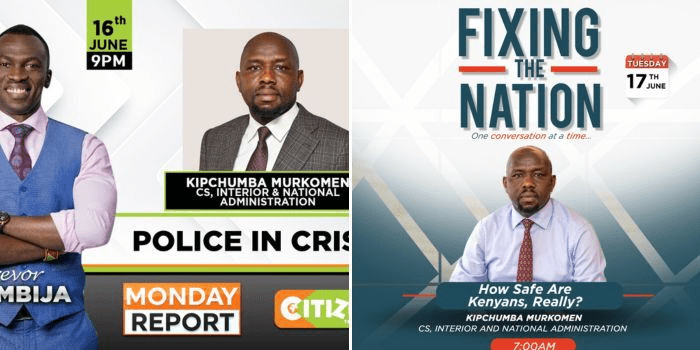Interior Cabinet Secretary Kipchumba Murkomen skipped two major media interviews this week, raising questions about the government’s commitment to addressing growing public outrage over police brutality and internal security failures.
Murkomen was expected to appear on Citizen TV’s Monday Report at 9:00 p.m. on June 16 to discuss the state of the National Police Service (NPS), but the interview was abruptly cancelled. Show host Trevor Ombija informed viewers that the CS was reportedly engaged in an official meeting.
The following morning, the CS was also scheduled to appear on NTV’s Fixing the Nation for a live 7:00 a.m. broadcast, but that too was postponed.
“Rescheduled: Our conversation with CS Murkomen has been postponed due to unforeseen circumstances. We are actively working to confirm a new date,” NTV announced.
The back-to-back cancellations have sparked concern amid mounting criticism over the Interior Ministry’s handling of high-profile cases of police misconduct—chief among them, the alleged custodial death of Albert Ojwang, a beloved teacher and content creator.
Ojwang’s case has ignited national outrage, with rights groups and opposition leaders accusing the government of shielding senior police officers, including Deputy Inspector General Eliud Lagat, who has been named in witness testimonies as having ordered Ojwang’s abuse while in custody.
Murkomen’s absence from public interviews comes at a moment of intense scrutiny. While defending the government’s role during a Senate appearance on June 11, he cited constitutional limitations that prevent the executive from interfering in police operations.
“Our role as the Executive is restricted to setting policy and facilitating institutions like the NPS with resources,” Murkomen told senators, referencing Article 245(4) of the Constitution.
The law bars the Cabinet Secretary from directing the Inspector General in the conduct of criminal investigations or enforcement actions targeting specific individuals. It also restricts the CS from intervening in personnel matters such as suspensions or dismissals.
Despite those constraints, Murkomen announced a series of proposed reforms intended to restore public trust in the police service:
- New recruitment policy focusing on specialised officers trained in modern, community-based policing.
- Mandatory installation of CCTV cameras in all police stations, with footage accessible to the Officer Commanding Station (OCS) in real-time and backed up securely.
The CS also stated that the ministry would facilitate institutional reforms but reiterated that accountability for police conduct lies with independent oversight bodies such as the Independent Policing Oversight Authority (IPOA) and the Internal Affairs Unit (IAU).
Still, the failure to appear before the media at such a critical time has drawn sharp criticism online, with civil society leaders accusing the government of dodging public accountability.
As calls for justice for Ojwang grow louder and pressure builds on the Ruto administration to act decisively, all eyes remain on Murkomen to provide clarity—and leadership—in a ministry under siege.

